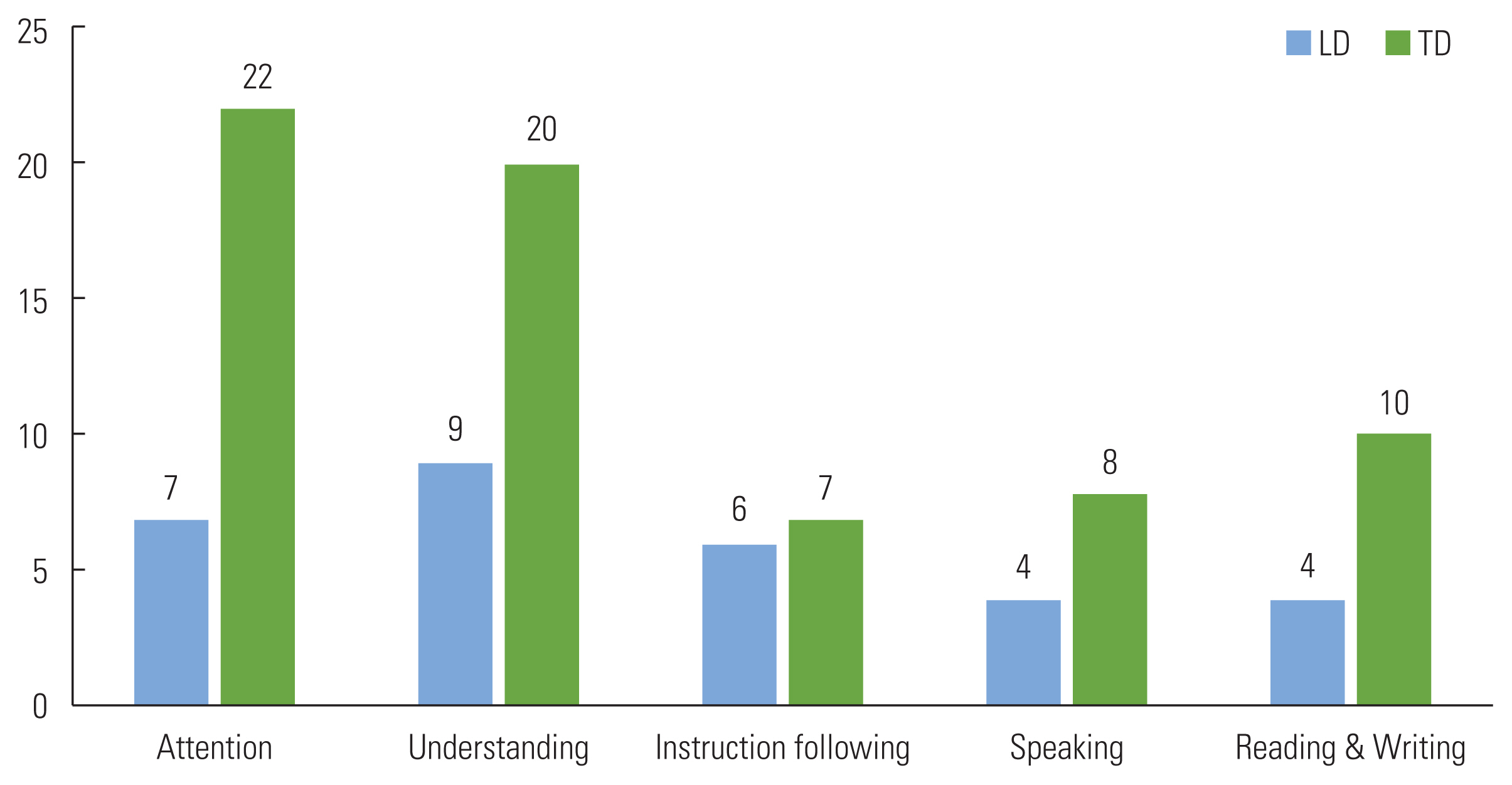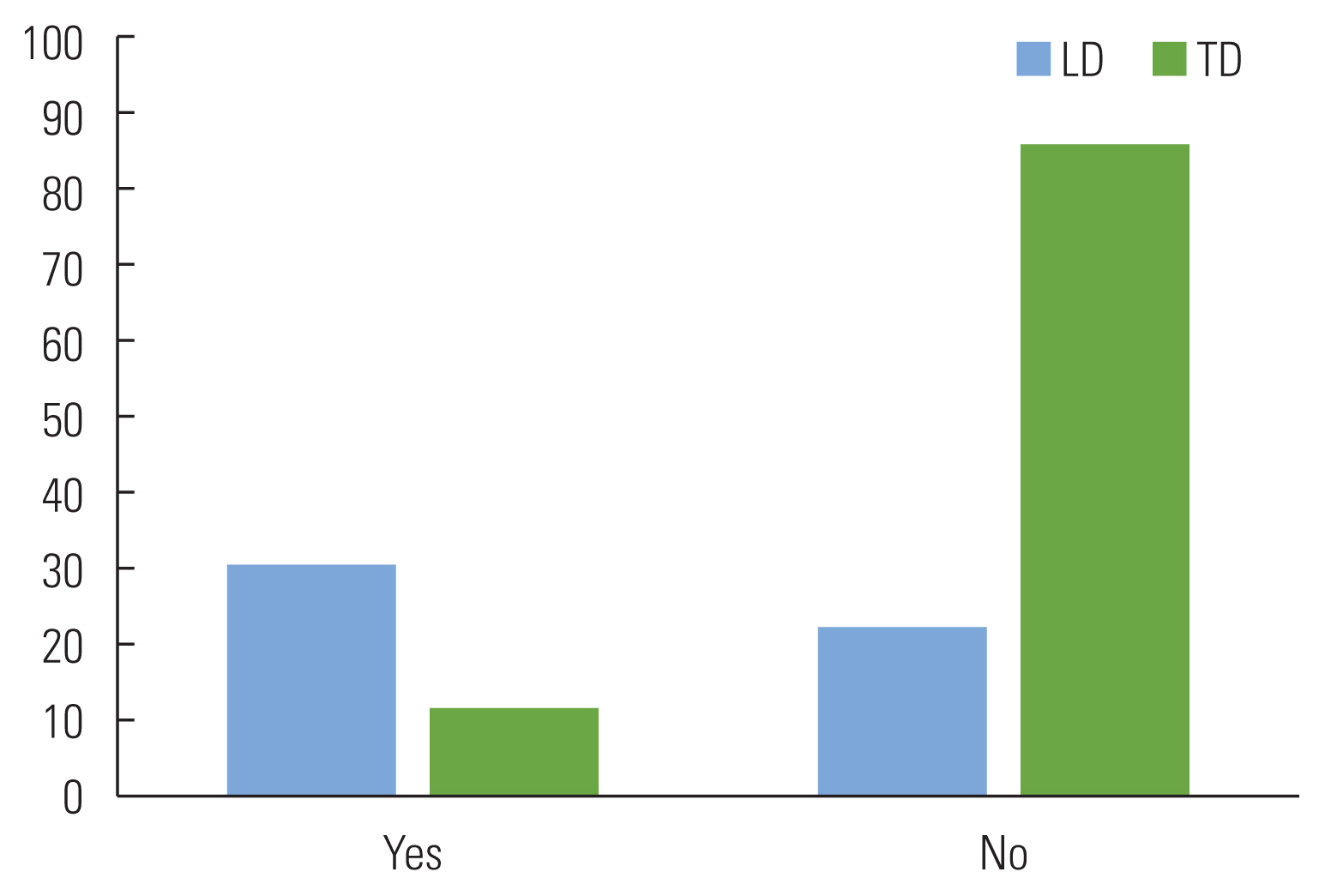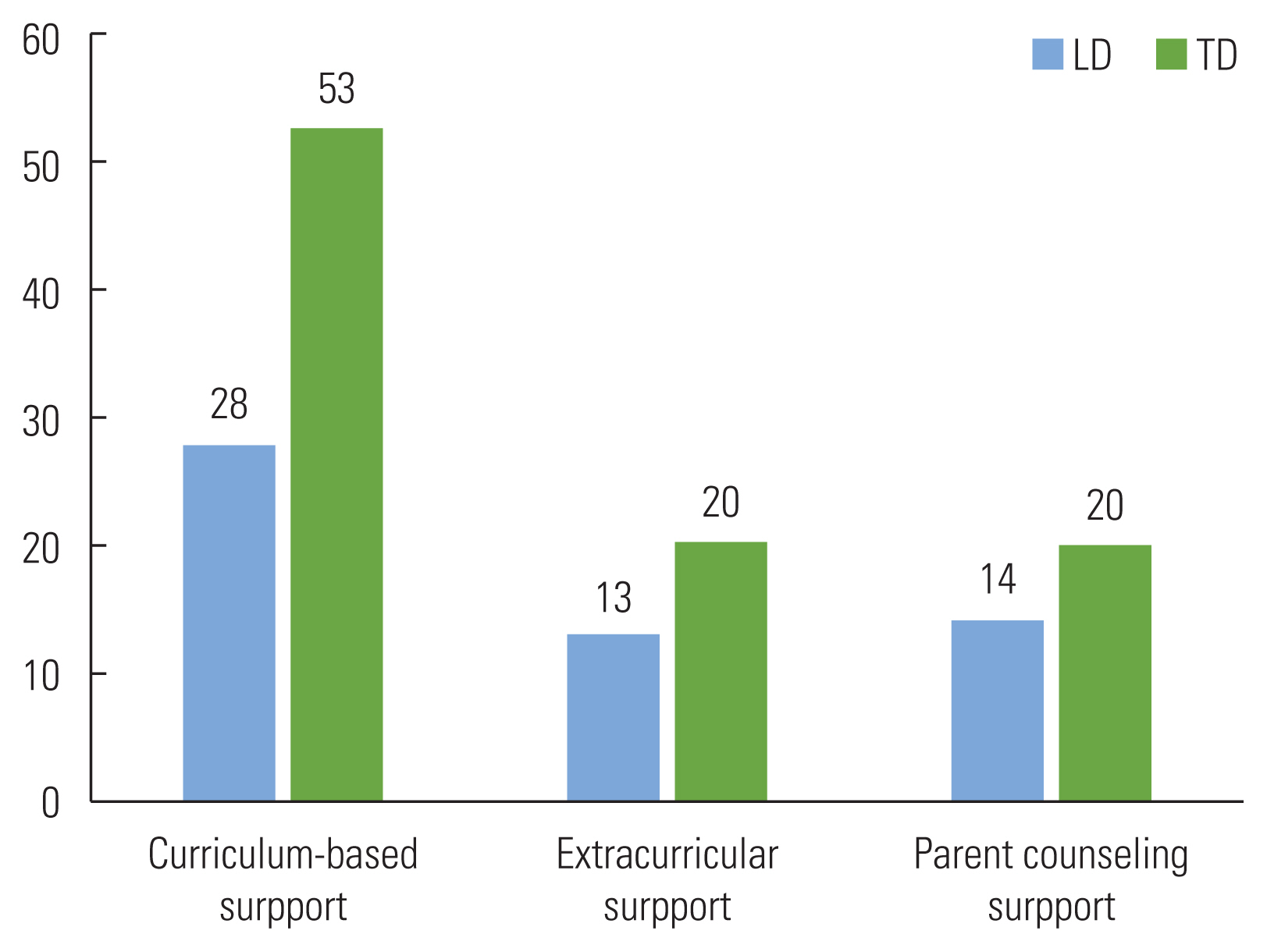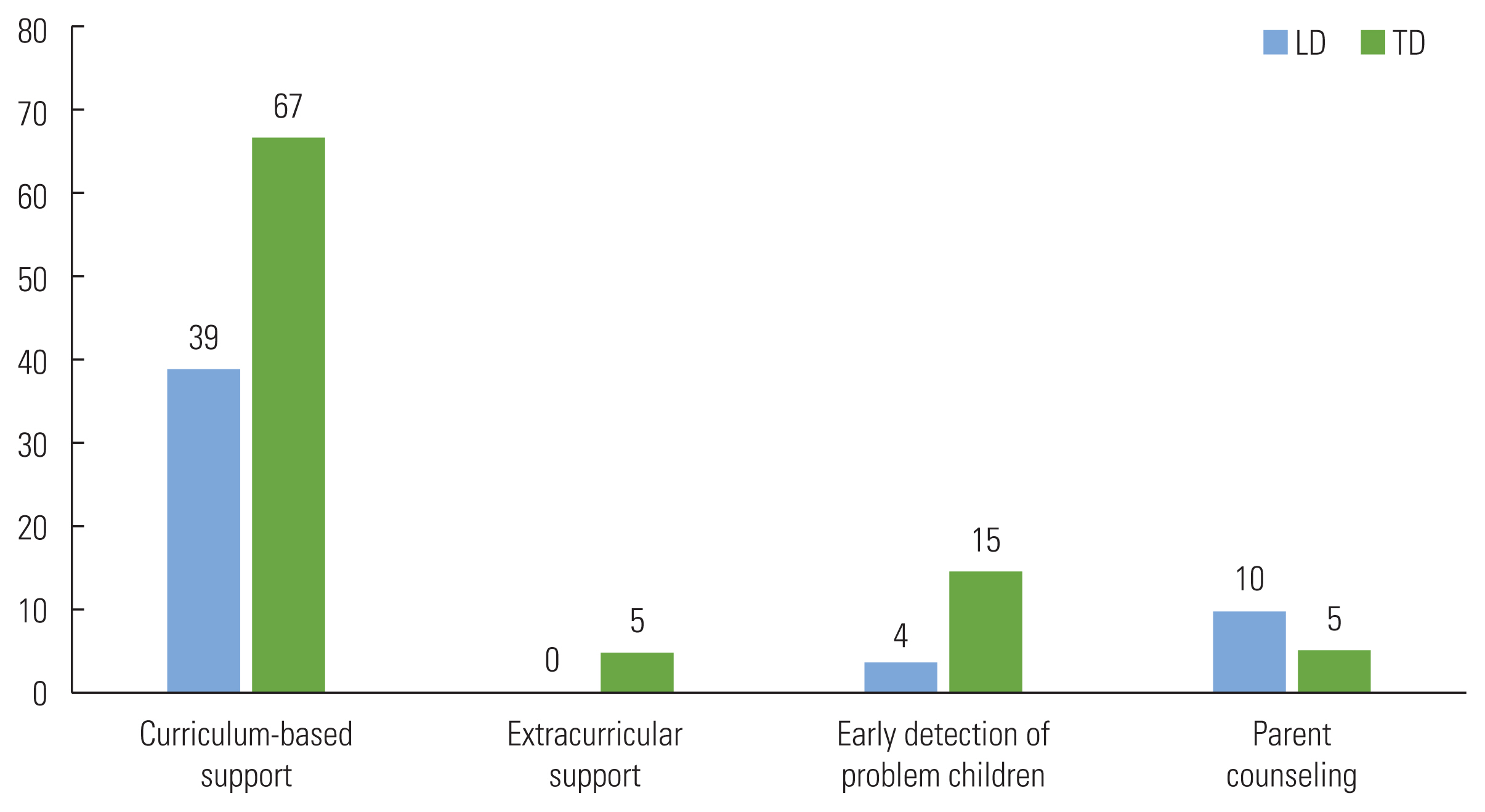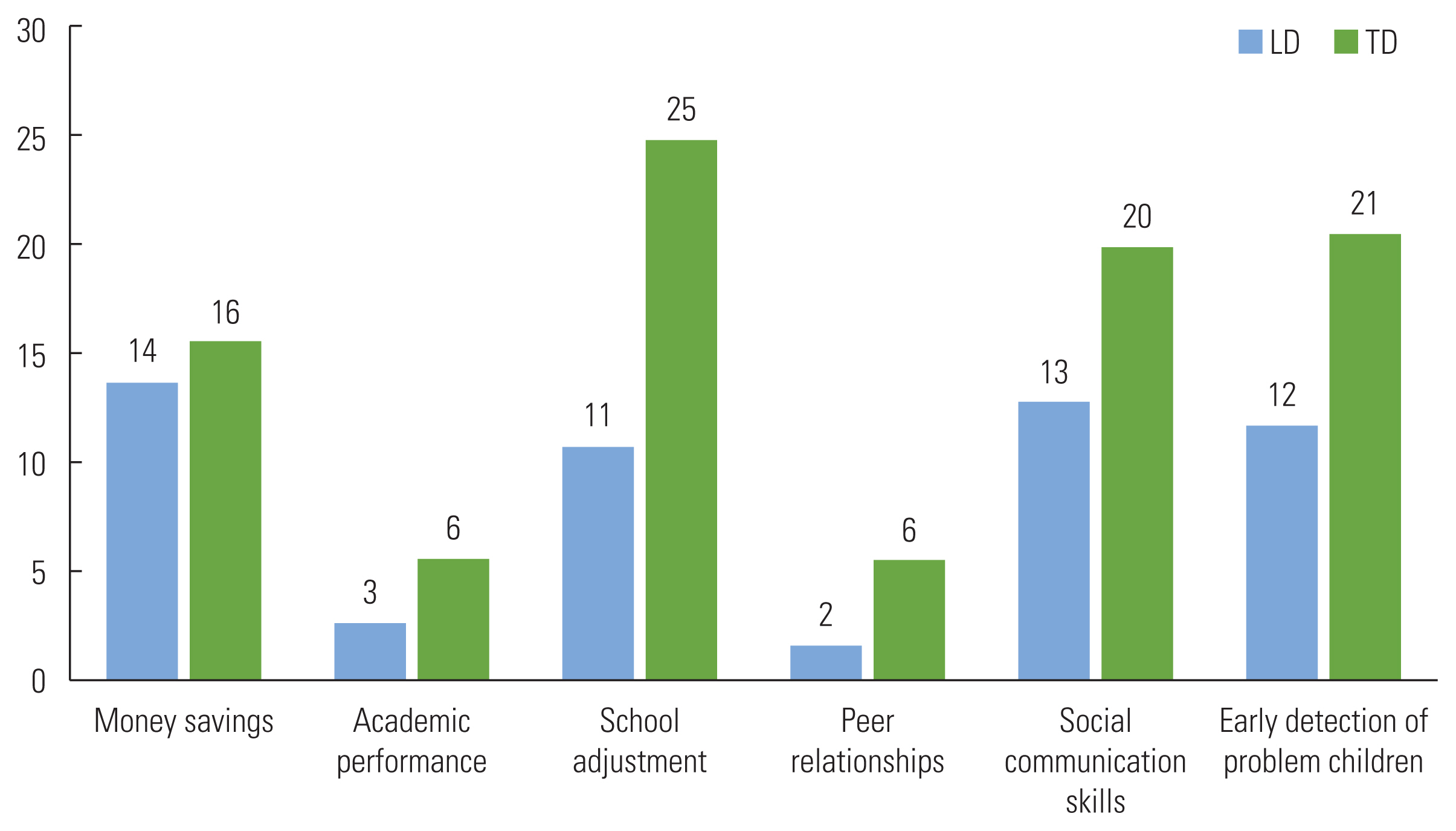INTRODUCTION
Most children develop their communication skills through the course of kindergarten and elementary school, but some children do not have the same levels of language skills as their peers [1]. As language plays a critical role in learning, children with language issues may face certain challenges in their school lives. Their limited language ability can lead to difficulties in learning as well limit their relationships with others in social situations [2ŌĆō5].
Research has shown that school teachers experience difficulties in meeting the needs of children with language problems [6ŌĆō8]. In many cases, additional support is required for children with communication disorders to close the gap with their peers [6], and the most important predictor of requiring high-level supports in the school environment is the presence of communication difficulties in a student [8].
In response to this demand, speech-language pathologists (SLPs) have been working in school settings for a long time in the United States, Canada, and the United Kingdom. It has recently been reported that more than 50% of SLP in the United States is served in schools and educational settings [9]. School-based SLP plays a leading role in assessing how a studentŌĆÖs communication difficulties actually affect their academic outcomes. School-based SLPs not only directly provide language rehabilitation services, but they also provide expert opinions that allow for language instruction that meets the educational standards of the class to be included in the curriculum of the entire class.
For a successful school-based service delivery in speech-language pathology, cooperation with the SLPs and teachers as well as parents is essential. The American Speech-Language-Hearing Association defines family collaboration as an essential component of providing school-based speech rehabilitation services for children of all ages [9]. Kindergarten and elementary school comprise an important period for children, as communication at school during this time not only has an important effect on their adaptation to school life and their learning ability, but it also affects their educational achievement, future life, and society as a whole [10].
During kindergarten and elementary school, children may require short-term or long-term language interventions for various reasons, such as articulation disorders, stuttering, voice misuse, and multicultural environments, as well as language disorders with congenital causes. School-based service delivery in speech-language pathology is desirable in that interventions can be performed naturally and effectively in a practical and familiar environment.
However, as the need for school-based service delivery in speech-language pathology could differ according to each childŌĆÖs language abilities, the parents of children with language problems and the parents of children without language problems may differentially perceive the need for school-based service delivery in speech-language pathology. Accordingly, this study investigated the perceptions of school-based service delivery in speech-language pathology among parents of children with and without language problems.
MATERIALS AND METHODS
1. Participants
In this study, questionnaires were distributed to parents of kindergartens and elementary school students residing in Korea. Parents were recruited through language therapy centers, welfare centers, kindergartens, and elementary schools, and 152 responses were obtained. Table 1 presents the participantsŌĆÖ demographic information. All participants read the explanation of the purpose and procedure of the study before participating in the study, and they all agreed to participate in the study.
2. Procedures
This study was conducted with the approval of the Institutional Review Board of Honam University (1041223-202108-HR-16). The purpose of this study was to elucidate the perceptions of parents of children with language problems and parents of children without language problems regarding the difficulties in academic performance and peer relationships caused by language problems, the need for school-based service delivery in speech-language pathology for academic purposes, and the need for school-based service delivery in speech-language pathology for social communication. The questionnaire was composed by referring to previous research by Choi & Lee [11]. The questionnaire was revised and supplemented by two experts (one professor in a speech-language pathology department and one first-class speech language pathologist) after verifying the validity of the contents and the required time. The questionnaire assesses (a) background information on the children and their caregivers, (2) difficulties in academic performance and peer relationships due to language problems, (3) the perceived need for school-based service delivery in speech-language pathology for academic purposes, and (4) the perceived need for school-based service delivery for social communication. The questionnaire was administered to parents who were recruited through the language therapy centers, welfare centers, and schools through a Google questionnaire form.
3. Data Analysis
The data collected in this study were analyzed using IBM SPSS Statistics version 25.0 (IBM, Armonk, NY, USA). Frequency and percentage were calculated to understand the distribution of responses to the basic information of subjects, and a chi-square (Žć2) test was conducted to analyze the differences in responses.
RESULTS
1. The perception of parents of children with and without language problems in terms of the effects of their childrenŌĆÖs language problems on their academic performance and their peer relationships
To determine whether there is a difference in the perceptions of parents of children with language problems and parents of children without language problems in terms of the academic and social difficulties caused by their childrenŌĆÖs language problems, parents were surveyed on (1) whether their childrenŌĆÖs language-based skills (speaking, listening comprehension, reading, writing, etc.) affect their academic performance, (2) whether their children actually have difficulties in academic performance due to their language abilities, (3) if so, in which areas specifically they have difficulties, and (4) whether their children have difficulties in their school lives due to difficulties communicating with their peers.
First, in terms of whether language-based skills affect their childrenŌĆÖs academic performance, the vast majority of both parents of children with language problems (80.0%) and parents of children without language problems (73.2%) answered ŌĆśto a great extentŌĆÖ (Figure 1); these responses were followed in order by ŌĆśsomewhatŌĆÖ (16.4% for children with language problems, 20.6% for children without language problems) and ŌĆśaverageŌĆÖ (3.6% for children with language problems, 4.1% for children without language problems), while small number of parents of children without language problems responded ŌĆśvery littleŌĆÖ (1.0%) or ŌĆśnot at allŌĆÖ (1.0%). There were no significant differences between groups.
In terms of whether or not their children actually have difficulties in academic performance due to their language abilities, 98.2% of parents of children with language problems and 89.7% of parents of children without language problems answered ŌĆśyesŌĆÖ, and there was no significant difference between the groups.
For those answering ŌĆśyesŌĆÖ, regarding the specific area of their childrenŌĆÖs academic difficulties, parents of children with language problems responded, in descending order, ŌĆśunderstanding the class contentsŌĆÖ (69.2%), ŌĆśattention in classŌĆÖ (53.8%), ŌĆśfollowing instructionsŌĆÖ (46.2%), ŌĆśspeaking in presentationsŌĆÖ and ŌĆśreading and writingŌĆÖ (30.8%). Meanwhile, the responses of parents of children without language problems were, in descending order, ŌĆśattention in classŌĆÖ (61.1%), ŌĆśunderstanding class contentsŌĆÖ (55.6%), ŌĆśreading and writingŌĆÖ (27.8%), ŌĆśspeaking in presentationsŌĆÖ (25.0%), and ŌĆśfollowing instructionsŌĆÖ (19.4%) (Figure 2).
57.4% of parents of children with language problems and 11.3% of parents of children without language problems answered ŌĆśyesŌĆÖ to whether children who have difficulties communicating with their peers have difficulties in social school life in addition to academic activities; there is a significant difference between groups (Žć2=.000) (Figure 3).
2. ParentsŌĆÖ awareness of the need for school-based service delivery in speech-language pathology for academic performance
To determine if there is a difference in the perceptions of parents of children with and without language problems regarding the need for school-based service delivery in speech-language pathology for academic purposes, parents were asked (1) whether or not it is necessary to provide school-based service delivery in speech-language pathology for students who have difficulties in academic performance, (2) what type of support they would desire in such school-based service delivery, and (3) what areas they expected would be helpful when applying school-based service delivery.
First, 100% of parents of children with language problems and 99.0% of parents of children without language problems answered ŌĆśyesŌĆÖ to the need for school-based service delivery in speech-language pathology for students who have difficulties in academic performance, and there was no significant difference between groups.
Regarding the desired support method when applying for school-based service delivery in speech-language pathology, both parents of children with language problems (50.9%) and those without language problems (57.0%) most wanted ŌĆścurriculum-based supportŌĆÖ; beyond that, parents of children with language problems wanted ŌĆśparent counseling supportŌĆÖ (25.5%) and ŌĆśextracurricular supportŌĆÖ (23.6%) whereas parents of children without language problems responded with equal levels of ŌĆśextracurricular supportŌĆÖ and ŌĆśparental counseling supportŌĆÖ at 21.5% (Figure 4).
Regarding the areas that are expected to be helpful when applying school-based service delivery in speech-language pathology, parents of children with language problems showed the highest responses in ŌĆśimprovement of academic performanceŌĆÖ and ŌĆśimprovement of social communication skillsŌĆÖ at 30.9%, followed in order by ŌĆśimprovement of school adjustmentŌĆÖ (27.3 %) and ŌĆśimprovement of peer relationshipsŌĆÖ (9.1%) (Figure 5). Meanwhile, for parents of children without language problems, ŌĆśimprovement of school adjustmentŌĆÖ was the most common response at 47.3%, followed in descending order by ŌĆśimprovement of social communication skillsŌĆÖ (28.0%), ŌĆśimprovement in academic performanceŌĆÖ (18.3%), and ŌĆśimprovement in peer relationshipsŌĆÖ (6.5%).
3. Awareness of parents of children with and without language problems on the need for school-based service delivery in speech-language pathology for social communication skills
To determine whether there is a difference in the perceptions of parents of children with and without language problems on the need for school-based service delivery in speech-language pathology for social communication skills, it was examined (1) whether or not it is necessary to provide school-based service delivery in speech-language pathology for students who have difficulties in social communication skills, (2) what type of support parents desired in such school-based service delivery, and (3) what areas they expected to be helpful when applying school-based service delivery.
First, 94.5% of parents of children with language problems and 94.8% of parents of children without language problems answered ŌĆśyesŌĆÖ to the need for school-based service delivery in speech-language pathology for students who have difficulties in social communication, and there was no significant difference between groups.
Regarding the desired support method for school-based service delivery, both parents of children with language problems (73.6%) and those without language problems (72.8%) most wanted ŌĆścurriculum-based supportŌĆÖ. In the case of parents of children with language problems, ŌĆśparent counseling supportŌĆÖ (18.9%) and ŌĆśearly detection of problem childrenŌĆÖ (7.5%) followed as the most common responses, and no such parents wanted ŌĆśextracurricular supportŌĆÖ (Figure 6). Among parents of children without language problems, ŌĆśearly detection of problem childrenŌĆÖ accounted for 16.3% of responses, followed by ŌĆśextracurricular supportŌĆÖ and ŌĆśparent counseling supportŌĆÖ which both accounted for 5.4%.
Regarding the areas that are expected to be helpful when applying for school-based service delivery in speech-language pathology, among parents of children with language problems, ŌĆśreducing the cost of private education and speech therapyŌĆÖ was the most common response at 25.5%, followed in descending order by ŌĆśimprovement of social communication skillsŌĆÖ (23.6%), ŌĆśearly detection of problem childrenŌĆÖ (21.8%), ŌĆśimprovement of school adjustmentŌĆÖ (20.0%), ŌĆśimprovement of academic performanceŌĆÖ (5.5%), and ŌĆśimprovement of peer relationshipsŌĆÖ (3.6%) (Figure 7). For parents of children without language problems, ŌĆśimprovement of school adjustmentŌĆÖ was the most common response at 26.6%, followed in descending order by ŌĆśearly detection of problem childrenŌĆÖ (22.3%), ŌĆśimprovement of social communication skillsŌĆÖ (21.3%), ŌĆśreducing the cost of private education and speech therapyŌĆÖ (17.0%), ŌĆśimprovement of academic performanceŌĆÖ (6.4%), and ŌĆśimprovement of peer relationshipsŌĆÖ (6.4%).
DISCUSSIONS
This study aimed to understand the thinking of parents of children with and without language problems in kindergarten and elementary school. The purpose of this study was to compare and analyze the perceptions of the difficulties faced by children with learning problems in academic performance and peer relationships due to their language abilities, and the needs of school-based service delivery of speech-language pathology to improve childrenŌĆÖs academic performance and social communication skills by group.
First, both parents of children with and without language problems responded that their children had experienced difficulties in school due to their language problems. Considering that, in the school environment, most curriculum activities are conducted through some form of language, it seems natural that children with language problems would have difficulties in school [6]. The results of this survey showed that the same was true for the children without language problems. However, there was a difference in the perceptions of parents of children with and without language problems in terms of whether they felt that their children faced difficulties in school life due to the difficulties they had communicating with their peers. Among parents of children with language problems, more than half answered that their children had experienced difficulties due to difficulties communicating with their peers, whereas only 11% of parents of children without language problems answered ŌĆśyesŌĆÖ to the same question. Although both parents of children with and without language problems agree on the importance of school language abilities, parents of children without language problems are mostly aware of the difficulties in classroom discourse and literacy, whereas parents of children with language problems are, in addition to these concerns, also aware of the difficulties in social communication [2,5].
Second, it was found that most parents of children with and without language problems agreed on the need for school-based service delivery in speech-language pathology for children who have difficulties in academic performance. Regarding the desired support method for school-based service delivery, more than half of both groups indicated that they wanted ŌĆścurriculum-based supportŌĆÖ the most, thus indicating that they wanted everyday support included within the schoolŌĆÖs regular academic curriculum. Most parents of children with and without language problems also agreed on the need for school-based service delivery in speech-language pathology for social communication skills. Regarding the specific support method, more than 70% of both groups indicated that they wanted ŌĆścurriculum-based supportŌĆÖ, thus indicating that they wanted language intervention in the school environments, where children spend most of their time, rather than the pull-out method. The school environment not only provides opportunities for children receiving language therapy services to learn age-appropriate social communication skills through interactions with their peers, but it also helps in the natural generalization of the various skills acquired [12]. Notably, no parents of children with language problems indicated that they wanted ŌĆśextracurricular supportŌĆÖ.
Finally, parents of children with and without language problems showed differences in the areas that they expected would be helpful with school-based service delivery in speech-language pathology for academic performance and social communication skills. Among parents of children without language problems, in both cases, they said that it would be most helpful for ŌĆśimproving school adjustmentŌĆÖ, whereas among parents of children with language problems, the service for academic performance would be most helpful for ŌĆśimproving academic abilityŌĆÖ whereas that for social communication skills would be most helpful for ŌĆśimproving social communication skillsŌĆÖ and ŌĆśreducing private education and speech therapy costsŌĆÖ. In other words, in the case of parents of children without language problems, it is expected that school-based service delivery in speech-language pathology will be helpful overall, whereas in the case of parents of children with language problems, it is expected that the service for academic performance will be particularly helpful in the academic area and the service for social communication skills will be particularly helpful in the social communication area. This is because children with language problems experience difficulties in their school lives due to their language problems, and they want specific and effective supports. When the service was provided based on the school curriculum in school environment, the language therapy had a positive effect on the academic achievement of the target students.
In conclusion, the results of this study show that parents of children with and without language problems in kindergarten and elementary school regard language abilities as important in their childrenŌĆÖs school lives, and they therefore strongly demand the need for school-based service delivery in speech-language pathology.
Recently, there has been a movement to provide school-based service delivery in speech-language pathology in Korea, such as the ŌĆ£Partial Amendment of the Elementary and Secondary Education ActŌĆØ, which requires special schools or metropolitan/provincial educational administrative institutions to have speech-language pathologists on staff. School-based speech-language pathologists are professionals who help children with various communication difficulties in school environments. Effective and systematic methods should be discussed so that school-based service delivery in speech-language pathology can be effectively established.










